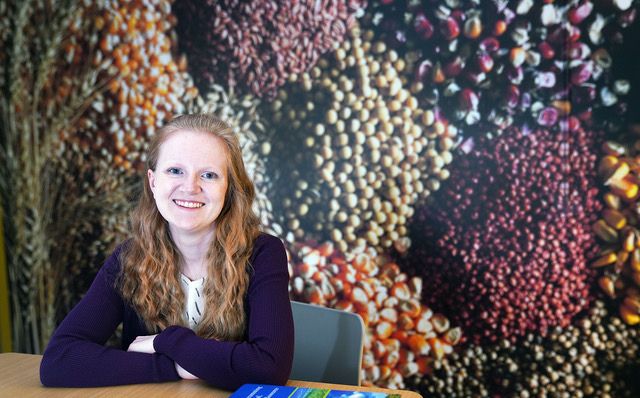Graduate Student Spotlight: Megan Hughes
"I’m interested in the line between production and environmental economics — finding solutions that are profitable for farmers but also sustainable for the environment.”
— Megan Hughes, PhD student, Department of Agricultural Economics
 Megan Hughes (Photo by Tom Campbell)
Megan Hughes (Photo by Tom Campbell) The Student
Megan Hughes’ curiosity about how people make choices — and her desire to help them make more informed ones — led her to agricultural economics. The native of Woodstock, Illinois, grew up on a corn and soybean seed farm before earning a bachelor’s degree in agribusiness management at Michigan State University. “I always enjoyed my economics classes as an undergraduate,” she says. “I like using math and numerical methods to explain the behavioral phenomena we see in the world.” Her MSU advisor suggested that Hughes apply to graduate programs in ag econ, and a visit to Purdue confirmed her choice to come to West Lafayette in 2018: “I liked the atmosphere in the department, how friendly and collaborative it all was,” she recalls, After completing her MS in 2020, she began doctoral studies under co-advisors Carson Reeling, associate professor of agricultural economics, and Meilin Ma, assistant professor of agricultural economics — “some of the best mentors I could ask for,” Hughes says. “It’s an extension of my master’s work but builds on it in new and exciting ways.” She is taking this summer off for an internship with John Deere, where she will work on data analytics with the company’s sustainability team. She was excited to learn of the placement: “I think the work I’m going to get to do is tangential to the work I’m doing toward my degree and will be reinvigorating after four straight years at Purdue.”
The Research
Hughes’ research focuses on the structure of the carbon market and the gap between payments to farmers and their costs to generate these credits. Her goal is to contribute to solutions that balance profitability for growers with environmental benefits: “I hope we can provide decision tools to farmers to help them decide if they should undertake sustainable practices,” she explains. The work involves economic theory, writing models, and meeting with farmers, policymakers, and intermediaries in the carbon market system.
Opportunities
As a result of being named a 2022 Farm Foundation Ag Scholar, “I’ve had opportunities to attend interesting networking events that from a professional development standpoint, may be influential on my career,” Hughes says. She will further develop her teaching skills as lead instructor for the Data Analytics in Agribusiness course this fall. She is chair-elect of the Graduate Student Section of the Agricultural and Applied Economics Association, an elected position in which she will organize AAEA conference sessions as well as other programming to provide graduate students with professional development and career advancement opportunities. Hughes laughingly calls herself Co-Chair of the Biter Off of More than I Can Chew Club.
Future Plans
Hughes likely will complete her degree in 2024. “I would very much enjoy a balanced academic career where I would have research, teaching and extension,” she says, but she also remains open to insights her internship may provide into careers in industry. Away from the computer, Hughes takes time for a walk, run, bike ride or hike with friends. She also enjoys painting, especially landscapes. “Screen-free days are important to well-being in general,” she says.






